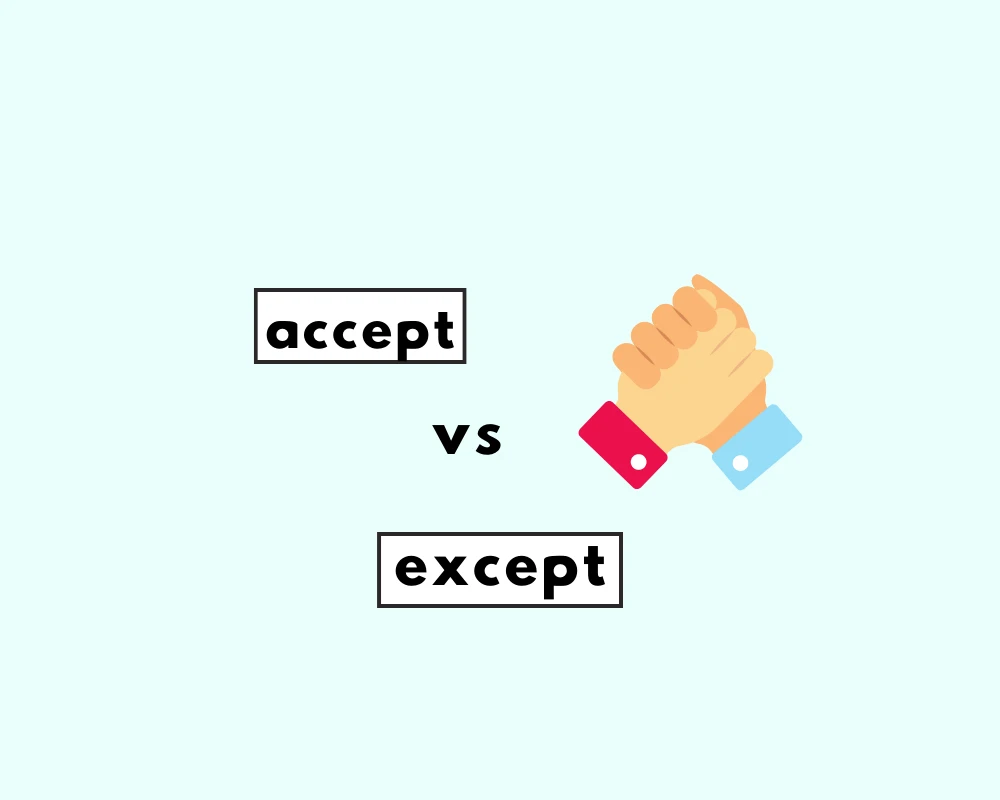How to use Accept vs. Except
I accepted the job offer because the salary was excellent.
Everyone went to the concert except for John, who was sick.
She excepted the award with grace.
All the students passed the test accept for one.
Did you accept the offer or except it? This post explains when to use accept vs. except so that you can learn the correct use with no exceptions!

The difference between except and accept
The answer is that you accept a job, but let’s see why.
| Sentences with the verb ‘accept‘ | Sentences with ‘except’ |
| The team captain accepts full responsibility for the defeat in the championship game. | Everyone was invited to the party except for Mark. |
Accept is a transitive verb that means “to receive (something offered) willingly: “I’ll accept her gift”; “an idea that is widely accepted“.
If someone gives you an excuse to explain why they’re late, you may accept or reject their reasons.
Except is mostly used as a preposition meaning “with the exclusion or exception of”; e.g., “we’re open for business every day except Sundays“; “Everyone was invited to the party except for me”.
- Except is also sometimes used as a conjunction meaning “but for that”, e.g., ‘I would have gotten home earlier, except that the traffic was horrendous‘.
You will rarely see ‘except‘ as a verb, as in ‘present company, excepted‘. Here, its meaning is similar to excluding or barring.
| Sentences with the preposition/conjunction/verb ‘except‘ |
| She likes all types of music except heavy metal.The bakery is open every day except Mondays. |
Synonyms of accept
Keep in mind that these synonyms can have slightly different nuances or connotations depending on the context in which they are used. Choose the word that best suits the context in which it’s being used.
- confirm
- have
- accede
- assent (to)
- support
- endorse
- warrant
- consent
- welcome
- abide
- adopt
- ratify
- concede to
- sanction
- embrace
- yield to
For instance, “ratify” implies formal approval, unlike the informal “accept.
Remember that “accept” is a verb meaning “to receive or agree to something,” while “except” is a preposition meaning “excluding” or “but.” Try substituting synonyms like “receive” for “accept” and “excluding” for “except” to check your usage.
Synonyms of except
Keep in mind that each of these synonyms might have different shades of meaning or usage. Choose the word that best fits the context you’re using it in.
- aside from
- barring
- besides
- but
- excluding
- other than
- save
- apart from
- outside of
For instance, “save” is more formal than “but” or “except.
The origin of accept/except
Late 14c., “to take what is offered; admit and agree to (a proposal, etc.),” from Old French accepter (14c.) or directly from Latin acceptare “take or receive willingly”.
Late 14c., excepten, “to receive,” from Old French excepter (12c.), from Latin exceptus, past participle of excipere “to take out, withdraw; make an exception, reserve,” from ex “out” (see ex-) + capere.
to take out,” from ex + capere “to take.
In review: accept and except
“Except” and “accept” are two words that sound similar but have different meanings and uses:
Except: (preposition) and a conjunction; it’s less commonly used as a verb. As a preposition, ‘except’ means to exclude or leave out something from a group or category.
Accept: verb meaning to receive, take, or agree to something offered or presented; “She accepted the invitation to the party“.
roposed; for example, “accept a gift” or “accept an invitation.
Read about other confusing words
like affect vs. effect, and principal vs. principle.
Work Sheet
According to the blog post, what is the main meaning of the verb “accept”?
In its most common usage, “except” functions primarily as what part(s) of speech?
Which of the following sentences, similar to examples in the post, uses the correct word?
A synonym for “except” mentioned in the post that means “excluding” is:
According to the post, using “except” as a verb is:
They decided to _____ the terms of the contract.
All the computers are working _____ for the one in the corner.
Will you _____ this gift from me?
She enjoys all fruits _____ bananas.
The committee voted to _____ the proposal.
Frequently Asked Questions
What is the main difference?
+
What part of speech is accept?
+
What part of speech is except?
+
How can I check my usage?
+
Can except be used as a verb?
+
Yash, D. "Accept vs. Except: What’s the Difference?." Grammarflex, Jun 15, 2025, https://www.grammarflex.com/accept-vs-except-whats-the-difference/.
Sources
-
“Accept.” Merriam-Webster.com Thesaurus, Merriam-Webster, https://www.merriam-webster.com/thesaurus/accept. Accessed 13 Aug. 2023. “Except.” Merriam-Webster.com Thesaurus, Merriam-Webster, https://www.merriam-webster.com/thesaurus/except. Accessed 13 Aug. 2023. Harper, Douglas. “Etymology of except.” Online Etymology Dictionary, https://www.etymonline.com/word/except. Accessed 13 August 2023. Harper, Douglas. “Etymology of accept.” Online Etymology Dictionary, https://www.etymonline.com/word/accept. Accessed 13 August 2023.











